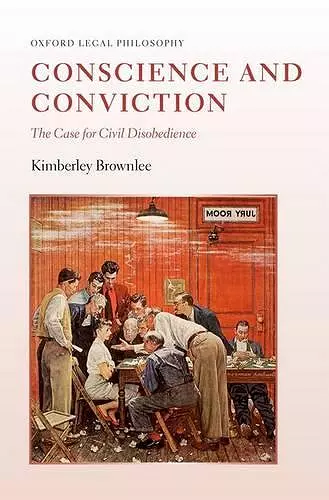Conscience and Conviction
The Case for Civil Disobedience
Format:Hardback
Publisher:Oxford University Press
Published:18th Oct '12
Currently unavailable, and unfortunately no date known when it will be back
This hardback is available in another edition too:
- Paperback£35.99(9780198759461)

The book shows that civil disobedience is generally more defensible than private conscientious objection. Part I explores the morality of conviction and conscience. Each of these concepts informs a distinct argument for civil disobedience. The conviction argument begins with the communicative principle of conscientiousness (CPC). According to the CPC, having a conscientious moral conviction means not just acting consistently with our beliefs and judging ourselves and others by a common moral standard. It also means not seeking to evade the consequences of our beliefs and being willing to communicate them to others. The conviction argument shows that, as a constrained, communicative practice, civil disobedience has a better claim than private objection does to the protections that liberal societies give to conscientious dissent. This view reverses the standard liberal picture which sees private 'conscientious' objection as a modest act of personal belief and civil disobedience as a strategic, undemocratic act whose costs are only sometimes worth bearing. The conscience argument is narrower and shows that genuinely morally responsive civil disobedience honours the best of our moral responsibilities and is protected by a duty-based moral right of conscience. Part II translates the conviction argument and conscience argument into two legal defences. The first is a demands-of-conviction defence. The second is a necessity defence. Both of these defences apply more readily to civil disobedience than to private disobedience. Part II also examines lawful punishment, showing that, even when punishment is justifiable, civil disobedients have a moral right not to be punished. Oxford Legal Philosophy publishes the best new work in philosophically-oriented legal theory. It commissions and solicits monographs in all branches of the subject, including works on philosophical issues in all areas of public and private law, and in the national, transnational, and international realms; studies of the nature of law, legal institutions, and legal reasoning; treatments of problems in political morality as they bear on law; and explorations in the nature and development of legal philosophy itself. The series represents diverse traditions of thought but always with an emphasis on rigour and originality. It sets the standard in contemporary jurisprudence.
In Conscience and Conviction: The Case for Civil Disobedience, Kimberly Brownlee provides a strong, well-argued theoretical justification of conscientious objection and civil disobedience... It is noteworthy that Brownlee's careful consideration of numerous objections and her well-reasoned replies clearly demonstrates her deep commitment to scholarly dialogue. * Mark Wicclair, Journal of Moral Philosophy *
In her excellent new book Conscience and Conviction: The Case for Civil Disobedience, Kimberley Brownlee boldly contends that all else equal a court of law should neither convict nor punish such offenders.Perhaps the book's most outstanding feature is the moral sensitivity Brownlee displays throughout; this book does not merely contain an account of conscience-it exemplifies the exercise of one. Anyone who chooses to engage with Brownlee's book will be well rewarded for his or her decision to do so. * David Lefkowitz, Criminal Law and Philosophy *
Kimberley Brownlee's marvellous book Conscience and Conviction offers an original and powerful defence of civil disobedience. * William Smith, Criminal Law and Philosophy *
Kimberley Brownlee's Conscience and Conviction is the most systematic philosophical account we possess of the place of civil disobedience in liberal democratic theory. Actually, it is much more than that. It is a subtle and humane articulation of the notion of conscience itself, and a deep and searching exploration of the changes that would be wrought in our professional lives and in our lives as citizens were the claims of conscience to be taken seriously. * Daniel Weinstock, Criminal Law and Philosophy *
In her thorough, careful and insightful discussion, Kimberley Brownlee explores the nature of conscience and conscientious convictions and draws important conclusions concerning the justifiable protection of acts of civil disobedience...Brownlee has made an important contribution to the literature on civil disobedience. Her contribution will be a starting point for the future philosophical discussion of conscience and the protection of conscience in a liberal society. * Alon Harel, Notre Dame Philosophical Review *
Brownlee's impressive book provides an original, attractive and thought-provoking take on civil disobedience, inspired by a humanistic and essentially social vision of human beings: not simply pursuing their good in isolation from one another, but actively inquiring into how they ought to live, and doing so in deliberation with their fellow citizens. * Christopher Bennett, Public Law *
Kimberly Brownlee's Conscience and Conviction is a major contribution to how we should think about conscientious objection and civil disobedience that is both distinctive and innovative ... This book should be of great interest to anyone with interest in these specific issues, or in political and legal philosophy more generally. * Thom Brooks, Law and Philosophy *
ISBN: 9780199592944
Dimensions: 240mm x 174mm x 22mm
Weight: 580g
280 pages